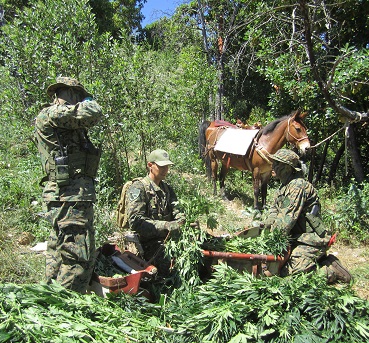How To Report A Grow House In California
What is illegal cultivation?
Illegal cannabis cultivation is cultivation outside of compliance with environmental laws and regulations, cultivation without permits from all applicable jurisdictions, or cultivation by persons prohibited by a court order. A common misconception is that only trespass grows on public or individual holding are illegal. This is imitation. If you are growing cannabis commercially on public or private holding, with or without the consent of the holding possessor, and you practise non have both a state license and local authorization, your grow is illegal and subject to immediate enforcement. Enforcement may include the seizure and destruction of your crop. Land police allows for medical collectives to operate until January 9, 2019 without a state license, merely the burden is on the collective to demonstrate compliance with the constabulary.
How does Police force Enforcement prioritize enforcement actions?
How does Constabulary Enforcement prioritize watersheds?
CDFW identifies, prioritizes, and inspects threatened watersheds. To identify threatened watersheds, CDFW evaluates:
- Listed species presence,
- Declines in fish population,
- Increases in sedimentation,
- Decreases in water quality and quantity, and
- Loftier-use watersheds.
Working with scientists, other agencies, and environmental information, CDFW Constabulary Enforcement determines where best to focus enforcement try.
What is the Marijuana Enforcement Squad?
The Marijuana Enforcement Team (MET) team includes CDFW Law Enforcement Officers defended to eradicating trespass grows on state and federal lands. These grows are typically associated with criminal enterprises such as drug trafficking organizations and pose a significant danger to the public and the environs. MET'southward master focus is apprehending illegal cultivators trespassing on public lands and the reclamation of public lands impacted by illegal marijuana cultivation sites.
Read an illegal cultivation eradication and restoration ![]() success story (PDF).
success story (PDF).
What is the Watershed Enforcement Program?
 CDFW's Watershed Enforcement Program (WEP) works collaboratively with the
CDFW's Watershed Enforcement Program (WEP) works collaboratively with the ![]() Land H2o Resource Control Lath (SWRCB) and
Land H2o Resource Control Lath (SWRCB) and ![]() CDFA to foreclose, investigate, enforce, and remediate environmental damage resulting from cannabis cultivation on private lands. As a multiagency job forcefulness, CDFW, SWRCB, and CDFA work collaboratively to identify unpermitted or unlicensed sites. During an inspection, CDFW will document the environmental impact from any Fish and Game Code violations, and the SWRCB will document the bear on from violations of the Water Code. CDFW Police force Enforcement may abort those on site for land law violations and may, in some cases seize, or destroy crops.
CDFA to foreclose, investigate, enforce, and remediate environmental damage resulting from cannabis cultivation on private lands. As a multiagency job forcefulness, CDFW, SWRCB, and CDFA work collaboratively to identify unpermitted or unlicensed sites. During an inspection, CDFW will document the environmental impact from any Fish and Game Code violations, and the SWRCB will document the bear on from violations of the Water Code. CDFW Police force Enforcement may abort those on site for land law violations and may, in some cases seize, or destroy crops.
The Watershed Enforcement Teams (WET) implement WEP objectives and include enforcement, permitting, and scientific staff. Depending on the inspection, additional entities may participate: Regional H2o Quality Control Boards, local law enforcement, county planning officials, or others. These teams focus on impacts from unpermitted cannabis cultivation on individual belongings including, but not express to:
- Habitat loss and fragmentation,
- Degraded riparian and wetland habitat,
- Reduction of instream flow,
- Improper swimming construction and stream crossings, and
- Improper road edifice and grading.
What is remediation?
Codes and penalties
There are additional penalties for violations of Fish and Game Code sections ![]() 1602 (substantial diversions, obstructions, or use of stream),
1602 (substantial diversions, obstructions, or use of stream), ![]() 5650 (water pollution), and/or
5650 (water pollution), and/or ![]() 5652 (disposal of trash near a water torso) in connectedness with the product or cultivation of a controlled substance (i.e., cannabis). The penalty may be up to $xl,000 per violation when associated with a trespass cannabis grow on public or private land. The penalization may be up to $20,000 per violation when associated with a non-trespass cannabis abound (on state owned/leased/or used with permission past the owner), and each day a violation "occurs or continues to occur" constitutes a separate violation (FGC § 12025(b)(2)).
5652 (disposal of trash near a water torso) in connectedness with the product or cultivation of a controlled substance (i.e., cannabis). The penalty may be up to $xl,000 per violation when associated with a trespass cannabis grow on public or private land. The penalization may be up to $20,000 per violation when associated with a non-trespass cannabis abound (on state owned/leased/or used with permission past the owner), and each day a violation "occurs or continues to occur" constitutes a separate violation (FGC § 12025(b)(2)).
CDFW may refer violators to the county district attorney or California Attorney Full general for criminal or civil activeness. Additionally, CDFW has the authority to impose civil penalties on those constitute to have violated Fish and Game Code sections 1602, 5650 and/or 5652 in connection with the production or cultivation of a controlled substance (i.e., cannabis) on public or private lands.
CalTIP
Members of the public remain our best source of information related to illegal cannabis cultivation. If yous witness a polluting or poaching incident, a fish and game lawmaking violation, or have data well-nigh a violation, telephone call CalTIP 1-888-334-CALTIP (888-334-2258), 24 hours a day, seven days a week.
Or download the CalTip App. The CalTip App provides an bearding ii-mode conversation with wild fauna officers. The CalTip App is costless at ![]() Google Play Shop and
Google Play Shop and ![]() iTunes App Shop.
iTunes App Shop.
Source: https://wildlife.ca.gov/Conservation/Cannabis/Enforcement

0 Response to "How To Report A Grow House In California"
Post a Comment